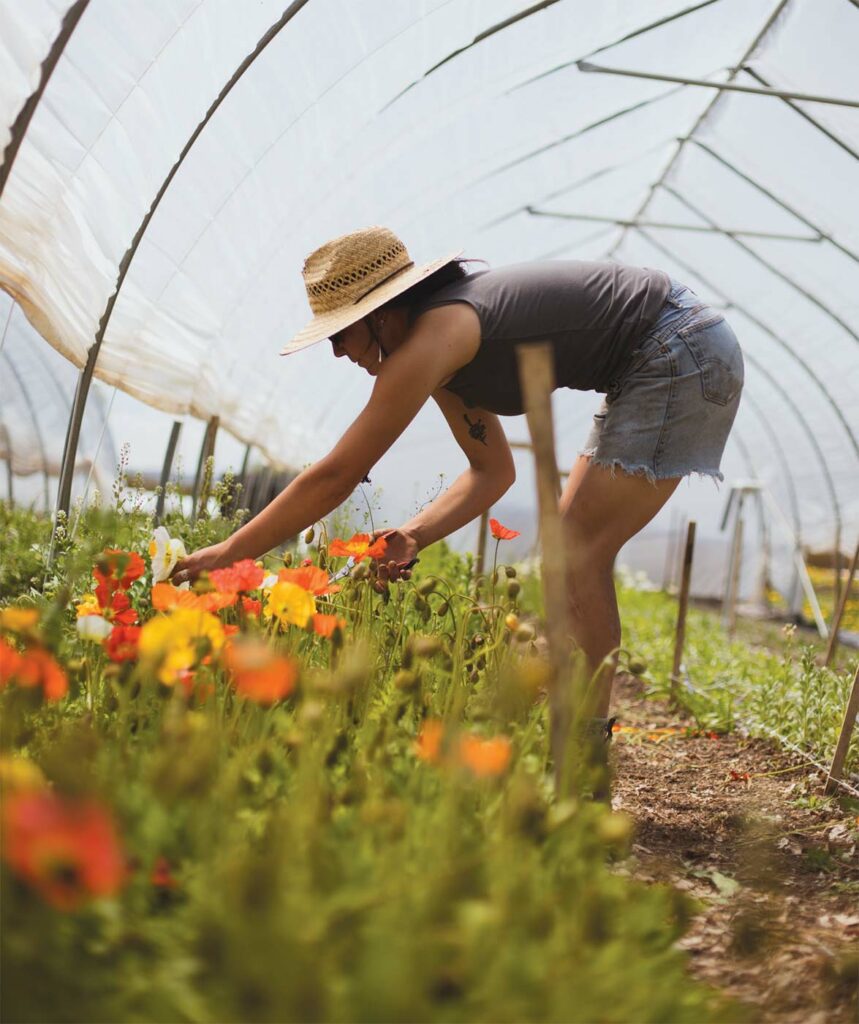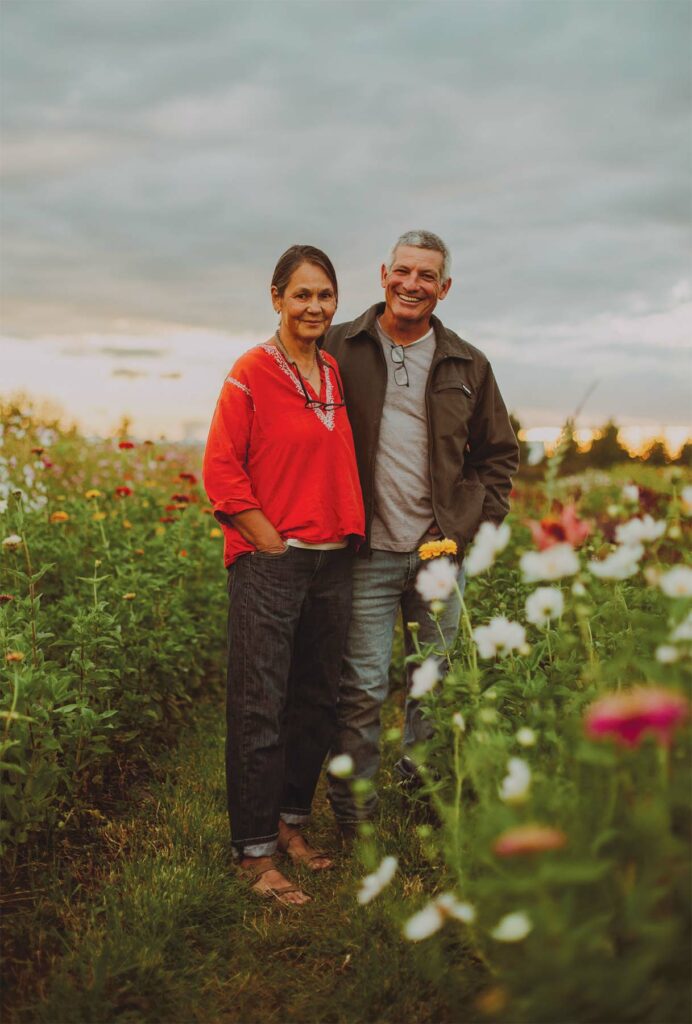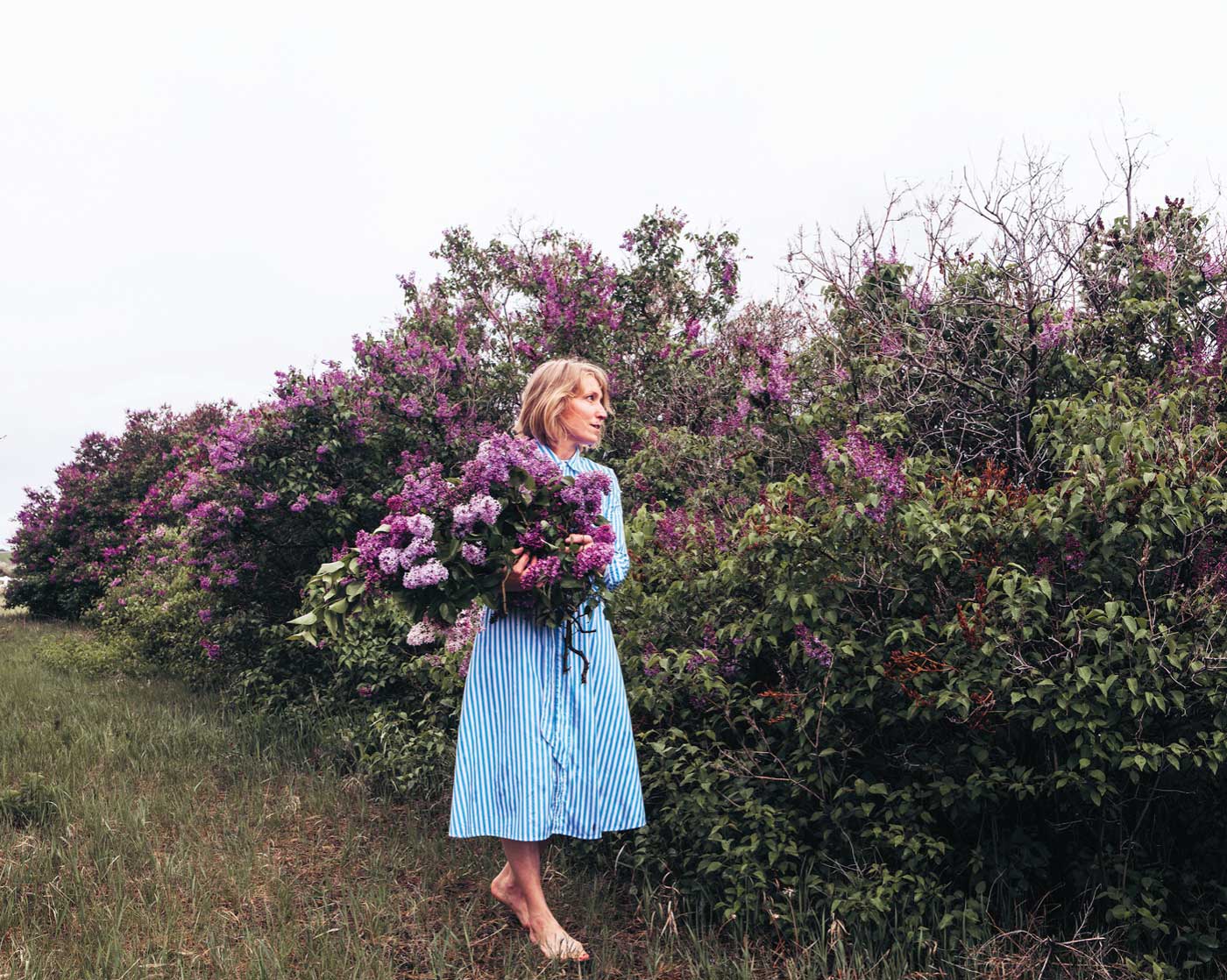The Family Farm Slowing Down Time in Central Bozeman
Sunflowers sway in the breeze. Snapdragon and sweet pea perfume fills the air. Mature willows speckle the ground with their lanky shadows, and I’m immediately lost in the romance. I’ve been transported to a place and time before the hustle and bustle of college kids and faculty whizzing by with their faces in their phones, before housing developments and construction crews clogged the skyline in every direction, and before tourists crowded Main Street in their brand-new cowboy boots and hats.
4 Daughters Farm, situated smack dab in the middle of the hubbub on Stucky Road, recalls an earlier era in Bozeman’s history, and May and Tom Heriza, its owners and operators, intend to keep it that way.
Though freshly cut flowers, U-pick raspberries, and smallscale agritourism don’t scream revolution, the Herizas’ 20- acre farm is a symbol of sovereignty in a sea of submission. “I do feel a little under siege,” Tom says. “I have to adapt to be an urban farmer.”
An “opportunity zone” distinction has encouraged investors to move on undeveloped land around the Heriza property. Luckily for the Herizas, their farm’s central Bozeman location makes it an ideal spot for customer traffic, complete with prime Gallatin Valley topsoil. While other enterprising entrepreneurs have capitalized on the valley’s population growth by building condos and subdivisions, the Herizas’ love of local agriculture has encouraged them to fend off land developers on this prime plot.
When it comes to sustainability, “You have to think pretty locally,” Tom says, adding that small farms could provide much of the food for this community.
Tom and May walk around the perimeter of their property and tell me about the land and the future of Bozeman farming. Their love for the land is tangible in the exquisitely manicured U-pick flower fields and raspberry bushes that invite both locals and visitors to partake in the season’s bounty. In addition to selling U-pick flowers, the Herizas also offer a flower CSA, sell at the Bozeman Farmers’ Market on Tuesdays, and have a farm shop on their property where they sell flowers, raspberries, and other farm products.
Though these fields have been bursting with buds and blooms for many seasons, 2023 was May and Tom’s first season running the farm by themselves. For the past decade, the Bozeman couple have leased their land to young up-andcoming farmers. In 2022, the farming duo responsible for Calliope Flowers worked and managed the fields. Before that, Strike Farms, Happy Trash Can Composting, and others got their start in farming on these verdant fields.



But in 2023, May quit her job as an academic advisor at Montana State University and Tom switched to part-time hours in his psychiatry practice to take over the farming operations. They’re betting on themselves to make small-scale agriculture profitable in the Gallatin Valley.
The Herizas are no strangers to the hard work and grit required of a successful farming operation. The couple spent many years in Tom’s rural hometown in northeastern Oregon (a town that’s barely changed in population since 1880), running cattle and sheep and growing vegetables for their tight-knit community. Tom worked long hours as a psychiatrist in the rural public health clinics, prisons, jails, and nursing homes, paying off medical school loans, while May raised their daughters among family and close neighbors.
“Those girls were feral!” May laughingly recalls.
But when 28 new lambs were born the same year May birthed twins, the couple knew they needed to scale down the farm for a while.
After a year living abroad in New Zealand, a job brought the young family to Bozeman. It was only a matter of time before the Herizas would make a go of farming in the Treasure State. Tom’s ancestors were Montana homesteaders ranching in the Bear Paw Mountains near Big Sandy who eventually left the state and headed to eastern Oregon when the mining boom brought floods of newcomers to their ranch land. The Herizas’ agricultural blood runs deep.
And to foster this heritage, the Herizas leased their land to young farmers who served as examples of what was possible. “They did incredible stuff!” May says of the young people who farmed on their land.
Calliope Flowers ran a successful U-pick, communitysupported agriculture (CSA) harvest subscription program, and event flower operation, while Strike Farms produced vegetables for CSA and farmers markets. Other young entrepreneurs ran cattle and sheep and hosted events on the property. Unlike many land stewards, May and Tom took their roles as mentors seriously. They encouraged, advised, and helped steward the young operations.
Similarly, May and Tom are excited for their daughters to be more involved on the farm. Alice Heriza, 25, the couple’s second-oldest daughter, started working full-time on the farm this past winter.
“She’s grown up with this stuff,” Tom says of Alice’s agricultural acumen and ability.
So far, Alice has taken a major role in the farm’s daily operations and decisions, knowing this business could carry her into her future. Previously, Alice spent two summers working on a fishing vessel in Alaska. A few years before that she worked on a sheep ranch in New Zealand. Even though flowers are new to her, the hard work comes naturally.
Tom walks into the cow pasture adjacent to the blooming and bustling flower fields. He rubs a cow’s forehead and tells me about her unique disposition and job on the farm. She’s by far the friendliest beef cow I’ve ever met. The ranch dogs yap at her ankles but she remains calm and composed, delighting in the head scratches and back rubs. In the distance, May greets and handles checkouts for her
U-pick customers under a portable white tent. Some have come to spend an evening with their friends in the flowers and raspberries. Others came with their partners to enjoy a unique date night in town, and some came alone to enjoy the solitude of the farm after putting their little ones to bed. Each farm patron appreciates the calm amid the chaos and the colors of the blooms. It’s tactile therapy for the mind, body, and soul, they tell me.
Tom loves watching his curated blooms being appreciated and sent to admiring homes around the valley. May is inspired by her customers’ creativity and floral creations.
The Herizas understand that flowers and berries probably won’t change the world, but they can slow it down, if only for a warm summer evening.




